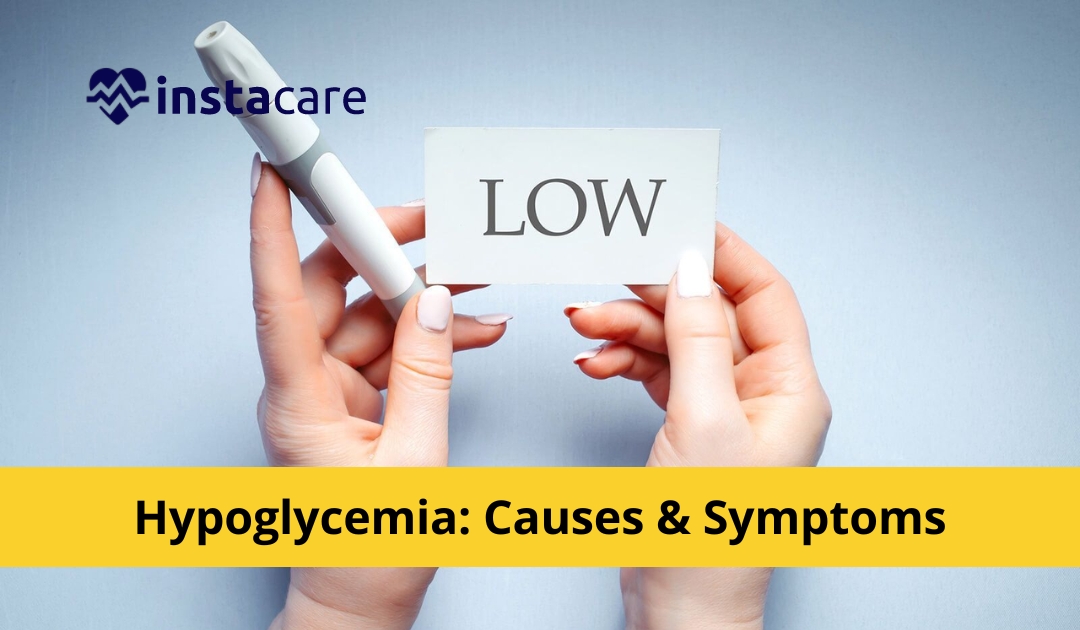Do you suffer from extreme fatigue, shakiness and confusion after a meal? You may have hypoglycemia. Hypoglycemia is an extremely common medical condition that affects both men and women. Knowing the causes, symptoms and treatment for hypoglycemia can help you get on top of this condition and lead a healthy life. This blog post will explain everything you need to know about hypoglycemia, so read on to learn more!
What is hypoglycemia?
Hypoglycemia, commonly known as low blood sugar, is a condition that occurs when your body's sugar levels fall below normal. It is important to understand and recognize hypoglycemia as it can have life-threatening consequences if left untreated. Symptoms of hypoglycemia include irritability, sweating, shaking, confusion, fatigue, dizziness, blurred vision and difficulty concentrating. If you are experiencing any of these symptoms or believe you may have hypoglycemia it is important to consult your doctor right away so that they can monitor your blood sugar levels and provide the best treatment plan for you. Hypoglycemia can be managed through diet, medication and lifestyle changes so diagnosis and treatment are key to help keep yourself healthy and safe.
How to know if you have hypoglycemia?
Hypoglycemia, also known as low blood sugar, should not be taken lightly. Knowing the symptoms can help you identify if you are suffering from the condition. Feeling dizzy or jittery and having a rapid heartbeat along with difficulty concentrating and light-headedness are common signs of hypoglycemia. Hunger that arises suddenly may also be an indication that your blood sugar is low. If you are experiencing any of these symptoms it is important to monitor your glucose levels and seek medical assistance if needed. Eating healthy, exercising regularly, and managing any underlying medical conditions can all help reduce the risk of developing hypoglycemia.
What causes hypoglycemia?
Hypoglycemia, or low blood sugar, is a common condition caused by a decrease in the amount of sugar (glucose) in the bloodstream. It can be a side effect of certain medications or health conditions that interfere with the body’s ability to process sugars properly such as diabetes and deficiencies of certain hormones. Consuming too much insulin or alcohol can also cause hypoglycemia as both substances cause an extreme decrease of sugar levels in the blood. It can also result from an inadequate intake of dietary carbohydrates in a meal, overwhelming exercise intensity and duration, skipping meals, vomiting and diarrhea. Hypoglycemia can be reversed by eating or drinking foods with glucose content such as hard candies, juice boxes, honey or corn syrups. If required, medications may be prescribed for more severe cases.
Risk Factors of Hypoglycemia
Hypoglycemia, or low blood sugar, is a serious medical condition that can lead to further health complications if not treated promptly. Risk factors for developing hypoglycemia include having diabetes and taking medication to control blood sugar levels such as insulin, sulfonylureas, glinides, and meglitinides. Additionally, regular ingestion of alcohol and skipping meals are two common lifestyle factors that can contribute to low blood sugar levels. Other risk factors include engaging in intense physical exercise or activities without eating beforehand and being afflicted with kidney, liver, or adrenal diseases. Furthermore, certain medications such as salicylates (aspirin) and chlorpromazine may also increase the risk of experiencing hypoglycemia. If you believe you may be at any risk of developing hypoglycemia, it is important to contact your doctor promptly.
Link between diabetes and hypoglycemia
Diabetes is a serious medical condition that affects millions of people each year. It is the result of insufficient insulin production in the body, which limits its ability to regulate blood sugar levels. Hypoglycemia, also known as low blood sugar, occurs when there is too much insulin and not enough glucose in the bloodstream. The high level of insulin triggers an extreme drop in blood sugar, leading to headaches, shakiness, confusion and even unconsciousness if left untreated. This link between diabetes and hypoglycemia shows just how important it is to monitor one’s glucose levels and be aware of how their body reacts to different foods. If you or a loved one suffer from diabetes, regular monitoring and appropriate treatment are important steps to prevent unwanted episodes of hypoglycemia.
View More: 8 Ways To Get Rid Of Stretch Marks Permanently Naturally
Symptoms of hypoglycemia
Hypoglycemia, more commonly known as low blood sugar, can have a wide variety of symptoms ranging from mild to severe. Some people may experience feelings of shakiness, hunger, confusion, and fatigue. Other more extreme symptoms include seizures, blurry vision, sweating, tremors, palpitations and irregular heartbeat. It is important to take these symptoms seriously and attend to them in order to prevent further health complications. It can be helpful to speak with your doctor or healthcare provider on how best to manage your hypoglycemia so that you can continue living an active and healthy life.
How is hypoglycemia diagnosed?
Hypoglycemia, also known as low blood sugar, is a medical condition that can have serious consequences. The diagnosis of hypoglycemia usually starts with the physician taking a medical history and performing a physical exam. A blood glucose test is then ordered to measure the levels of sugar in the body. If laboratory tests indicate that the patient has low levels of glucose, additional tests may be performed in order to confirm the diagnosis and decide if further treatment and management are required. Depending on individual circumstances, fasting plasma glucose or an oral glucose tolerance test may be performed to diagnose hypoglycemia. Proper diagnosis can be important for successful treatment, so it's important that your healthcare provider carefully consider all factors when suggesting tests and developing a plan for care.
Treatment of hypoglycemia
Hypoglycemia, or low blood sugar, is a medical condition caused by an abnormally low level of glucose in the bloodstream. Treatment for hypoglycemia usually begins with consumption of high-sugar foods such as candy, juice, and cookies. In some cases, an injection of glucagon can be used to quickly raise a person’s blood sugar levels back to normal. It is essential for those diagnosed with hypoglycemia to keep a close eye on their sugar intake and blood sugar levels in order to avoid any further health concerns that may arise from unmanaged hypoglycemic episodes. Fortunately, with proper monitoring and treatment implemented as soon as symptoms appear, people with hypoglycemia can still lead healthy lives.
How to prevent hypoglycemic?
Preventing hypoglycemia is an important concern for people who suffer from diabetes or other these types of diseases. Managing blood sugar levels through diet and exercise is the best way to manage hypoglycemic episodes. Eating smaller, more frequent meals throughout the day can prevent dramatic drops in blood sugar that can lead to hypoglycemic events. It’s also important for individuals with diabetes to maintain an active lifestyle, especially if exercising after eating a high carbohydrate meal. Additionally, monitoring blood sugar on a regular basis will allow patients to recognize when they may be at risk and then take action, such as having a snack or adjusting medication doses accordingly. By following these tips and taking the necessary precautions, people living with diabetes as well as their caregivers can take proactive steps toward preventing hazardous hypoglycemic events.
Please book an appointment with the Best Diabetologist in Lahore, Karachi, Islamabad, and all major cities of Pakistan through InstaCare, or call our helpline at 03100002273 to find a verified doctor for your disease.
Source: https://instacare.pk/blog/hypoglycemia-causes-symptoms-and-treatment








